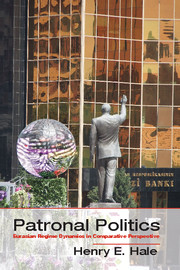Book contents
- Frontmatter
- Contents
- List of Figures
- List of Tables
- Acknowledgments
- Note on Transliteration
- 1 Introduction
- 2 Patronal Politics and the Great Power of Expectations
- 3 Eurasian History as Patronal Politics
- 4 Constitutions, Elections, and Regime Dynamics
- 5 The Emergence of Networks and Constitutions
- 6 The Building of Eurasia’s Great Power Pyramids
- 7 Revolutions and Other Presidential Ousters
- 8 Nonrevolution in Post-Soviet Presidential Systems
- 9 After Revolution
- 10 Patronal Parliamentarism
- 11 Explaining Post-Soviet Regime Dynamics
- 12 Patronal Politics in Global Comparative Perspective
- References
- Index
- References
3 - Eurasian History as Patronal Politics
Published online by Cambridge University Press: 05 November 2014
- Frontmatter
- Contents
- List of Figures
- List of Tables
- Acknowledgments
- Note on Transliteration
- 1 Introduction
- 2 Patronal Politics and the Great Power of Expectations
- 3 Eurasian History as Patronal Politics
- 4 Constitutions, Elections, and Regime Dynamics
- 5 The Emergence of Networks and Constitutions
- 6 The Building of Eurasia’s Great Power Pyramids
- 7 Revolutions and Other Presidential Ousters
- 8 Nonrevolution in Post-Soviet Presidential Systems
- 9 After Revolution
- 10 Patronal Parliamentarism
- 11 Explaining Post-Soviet Regime Dynamics
- 12 Patronal Politics in Global Comparative Perspective
- References
- Index
- References
Summary
The patronalistic soil in Eurasia is as rich as its Black Earth. In this sense, Eurasia features what might be called a typically patronalistic social context for politics, quite in line with much of the world outside the developed West throughout recorded history. While we must keep in mind that patronalism does not reduce to corruption, we would generally expect that highly patronalistic societies would also score high on measures of corruption. Figure 3.1 maps the most prominent such measure (Transparency International’s Corruption Perceptions Index) onto a flattened view of the globe for the year 2013. Darker hues identify countries where citizens, experts, and international businesspeople regard corruption to be particularly pervasive; here the post-Soviet world looks strikingly shady, as does most of the rest of the world. Measures of other concepts that the previous chapter discussed as likely to be correlated with patronalism produce similar portraits of Eurasia, such as the World Bank’s finding that post-Soviet countries have consistently scored quite low on its measures of the rule of law. All this reflects a reality long expressed in local popular culture, perhaps most famously through the joke – repeated over some two centuries of Russian history – that the severity of the country’s laws is tempered by the fact that you need not actually obey them.
The present chapter begins to show how the core logic developed in Chapter 2 can help us understand politics in highly patronalistic societies like those in Eurasia and illustrates patronalism’s dynamic long-run staying power by reinterpreting a millennium of Eurasian political history – in broad strokes, of course. It traces the emergence of the first large-scale polities in Eurasia and demonstrates how they were (naturally) characterized by patronal patterns of politics, an approach that enables us along the way to reconcile sides in long-standing debates among historians on the nature of authoritarian rule in the region (for example, how powerful was the tsar?) and to cast certain major events, such as the 1917 Bolshevik Revolution and the breakup of the USSR, in new light. The chapter, which takes us through the disintegration of the USSR, shows how the region’s patronalistic social-political equilibrium withstood even the most herculean of reform efforts.
- Type
- Chapter
- Information
- Patronal PoliticsEurasian Regime Dynamics in Comparative Perspective, pp. 39 - 60Publisher: Cambridge University PressPrint publication year: 2014
References
- 2
- Cited by



